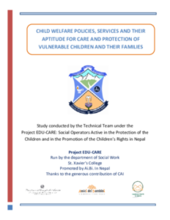The Technical Team under the Project “EDU-CARE: Social Operators Active in the Protection of the Children and in the Promotion of the Children’s Rights in Nepal” reports on the child care practices, policies, programs, and organizations currently in effect in Nepal, with a specific emphasis on children in residential care settings. Due to Nepal’s extreme poverty and social and political turmoil, there are many vulnerable children in the country. The poor child labor laws, frequent abandonment, child neglect, abuse, and malnutrition are a cause for concern and a reason for conducting this research.
The report is organized into six detailed chapters that describe: (1) the context, objectives, and methodology of the study (as well as the ethical considerations); (2) the current child protection policies, practices, mechanisms, and workforce capacity (with a focus on prevention of family separation); (3) partner agencies and organizations; (4) the capacity development of professionals working in the field of child protection; (5) findings of the study and identified gaps in service; and (6) recommendations to address gaps in services and policies. The study used qualitative methodology such as analyzing policies and existing data, questionnaires, interviews, focus group discussions, observations, and case stories. The study specifically examines the most vulnerable populations of children which include: street based children, abandoned children, child laborers, care leavers, and children living in slum/urban areas, juvenile correctional centers, and especially those children living in residential care homes.
The study identifies gaps in services, policies, and programs, as well as social services programs already existing. For instance, the study finds that: programs and services are limited in quantity, quality and variety; child protection services tend to focus more on responding to the immediate needs of vulnerable children and families rather than on prevention and rehabilitation with long-term perspectives; there are insufficient programs to support the prevention of family separation (though some are being implemented in particular regions); and that many parents are placing their children into institutional care as there are no alternatives to provide for the protection of their children. The report makes recommendations for needed improvements to contribute to strengthening the care, support, and protection of children provided by parents, guardians, social service agencies, NGO’s, and the government. These recommendations include: advocating for social work/child protection interventions for families, monitoring services and programs, expanding services to rural and remote areas, enhancing training for professionals, building collaboration for a better national welfare system, supporting reintegration of care-leavers, incorporating child protection in academic instruction, and more.

